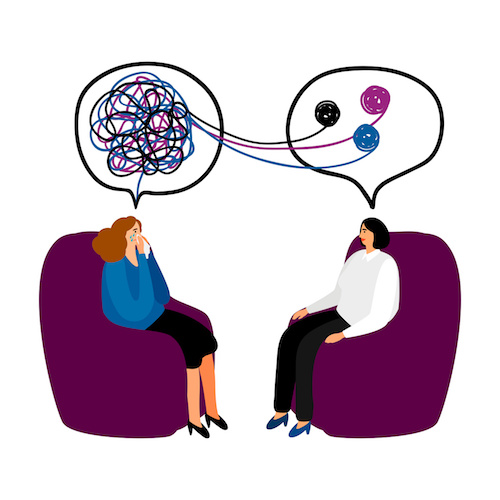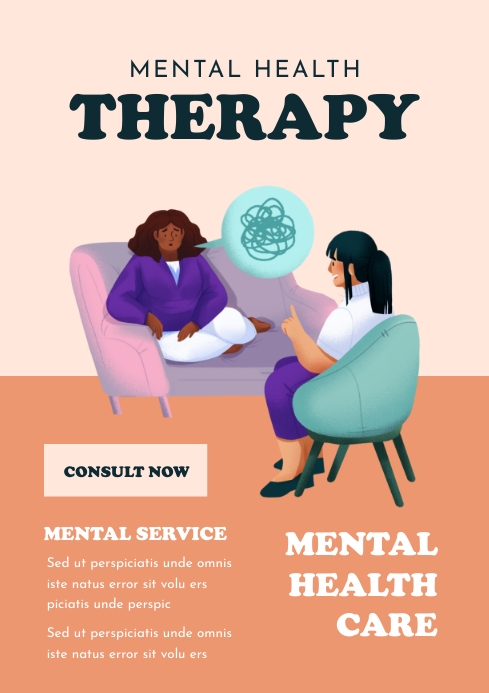The Relevance of Mental Health: a Deep Dive Into Counseling, Therapy, and Their Benefits
Mental health significantly forms specific wellness, influencing emotions, actions, and thoughts. Counseling and therapy act as necessary opportunities for healing and personal development. They use structured assistance, assisting individuals navigate life's challenges. Yet, many remain uninformed of the specific kinds of therapy readily available and their unique benefits. Comprehending these elements is necessary for any individual considering expert mental wellness support. What follows may illuminate courses to strength and fulfillment that lots of ignore.
Recognizing Mental Health and Its Impact
Psychological wellness is typically overlooked, it plays a necessary role in total well-being and daily functioning - Marriage Counselling. It includes emotional, mental, and social factors that affect just how people believe, feel, and behave. A person's mental health straight impacts their ability to take care of stress and anxiety, connect to others, and make selections. Poor mental wellness can result in various issues, including anxiousness, depression, and difficulty in maintaining partnerships, all of which can impede individual and specialist growth.Furthermore, mental health has far-ranging implications for physical health. Chronic stress and anxiety and untreated mental problems can add to different physical ailments, such as heart problem and damaged immune responses. Conversely, favorable psychological wellness cultivates durability, allowing individuals to handle life's challenges effectively. Understanding psychological health and wellness's importance is important for promoting encouraging settings that promote emotional wellness, therefore improving the top quality of life for individuals and communities alike
The Different Kinds of Counseling and Therapy
In the domain of psychological wellness, different therapy and therapy kinds cater to varied requirements. Individual therapy strategies concentrate on individual problems with one-on-one sessions, while group therapy dynamics foster shared experiences and support amongst individuals. Recognizing these methods is vital for picking the appropriate intervention for various difficulties.
Private Counseling Strategies
Countless specific therapy methods exist, each created to attend to details psychological wellness issues and deal with varying customer demands. Cognitive Behavioral Treatment (CBT) concentrates on identifying and changing adverse idea patterns, while Psychodynamic Therapy explores previous experiences and unconscious processes. Humanistic Treatment emphasizes personal development and self-actualization, cultivating a supportive environment. Interpersonal Treatment (IPT) targets connection concerns and communication patterns to enhance psychological well-being. Additionally, Acceptance and Commitment Treatment (ACT) motivates clients to approve their thoughts and sensations while committing to individual values. Each strategy uses unique methods and philosophies, allowing experts to customize their approaches to the individual, consequently enhancing the therapeutic experience and advertising psychological health and wellness healing.
Team Therapy Dynamics
Group treatment dynamics include various therapeutic approaches that utilize the power of social relationships and shared experiences. This form of treatment typically includes varied groups, fostering a safe atmosphere for individuals to share feelings and thoughts. Secret kinds of team therapy include support system, which provide psychological assistance; process-oriented teams, concentrating on interpersonal interactions; and psychoeducational teams, intended at passing on expertise regarding psychological health concerns. The dynamics within these groups can boost self-awareness, as participants usually assess their habits in regard to others. Additionally, group treatment fosters a feeling of belonging, lowering sensations of isolation. Through shared narratives and collective analytic, individuals can develop coping methods and obtain understandings, eventually adding to individual development and recovery.
The Function of Therapy in Mental Health And Wellness
Counseling plays a vital role in psychological wellness by offering different techniques customized to specific demands. These methods give professional support that can bring about substantial improvements in psychological health. Understanding the various sorts of therapy can help individuals make educated choices concerning their psychological health treatment.

Types of Therapy Techniques
While numerous counseling methods exist, each offers special methodologies and understandings right into mental health and wellness therapy - Marriage Counselling. Amongst one of the most popular are cognitive-behavioral treatment (CBT), which concentrates on altering unfavorable idea patterns; psychodynamic therapy, which discovers subconscious procedures and childhood experiences; and humanistic approaches, stressing individual growth and self-actualization. In addition, solution-focused brief therapy prioritizes locating options in the here and now as opposed to delving right into issues. Team therapy fosters area and shared experiences, while family therapy addresses relational dynamics within domestic structures. Each approach deals with various demands, lining up with private preferences, concerns, and restorative objectives. Understanding these approaches assists clients make educated options regarding their psychological health and wellness journey and promotes effective treatment tailored to their distinct circumstances
Advantages of Expert Support
Various individuals gain from professional guidance in handling their psychological wellness obstacles. Counseling supplies a safe area for customers to explore their ideas and feelings without judgment. This therapeutic environment cultivates self-awareness, permitting people to recognize patterns in their behavior and develop healthier coping methods. Professional support additionally gives accessibility to evidence-based techniques that can minimize signs and symptoms of stress and anxiety, anxiety, and various other psychological health and wellness concerns. Moreover, counselors can help in setting realistic objectives and supply assistance in attaining them, enhancing overall health. The joint relationship in between therapist and customer is essential, as it promotes liability and motivates personal development. Eventually, specialist advice plays an important duty in guiding mental wellness journeys, leading to improved emotional resilience and life complete satisfaction.
Advantages of Treatment: Recovery and Development

Just how to Choose the Right Therapist or Therapist
Exactly how can one browse the frequently frustrating process of picking the right therapist or counselor? Determining individual demands is necessary; individuals need to consider official website their certain concerns, whether relationship, anxiety, or anxiety obstacles. It is beneficial to study various therapeutic strategies, such as cognitive-behavioral therapy or psychodynamic therapy, to discover a suitable look at this site match.Next, potential clients must seek references from relied on resources or make use of on the internet directories. It is important to examine therapists' qualifications, including their education and learning, licensing, and locations of field of expertise. Scheduling preliminary assessments can help gauge compatibility, allowing individuals to evaluate communication styles and personal comfort.Finally, logistical factors, such as location, availability, and fees, must likewise be taken into consideration. By thoughtfully evaluating these aspects, one can make a notified decision, inevitably cultivating a therapeutic connection that sustains mental health and personal growth.
Conquering Stigma: Accepting Mental Health Assistance
While societal perspectives toward psychological health have actually evolved, stigma still offers a significant obstacle for numerous looking for assistance. This stigma often shows up as misconceptions bordering mental disease, leading people to feel pity or fear regarding their struggles. Numerous people think twice to pursue counseling or treatment as a result of worries about being evaluated or labeled. Overcoming this preconception is basic for fostering a helpful environment where people can freely review their mental health and wellness needs.Communities and organizations play an important duty in this change by advertising understanding and education and learning regarding psychological health and wellness issues. Initiatives that navigate to this site highlight personal stories can humanize these experiences, urging others to seek aid without fear. As acceptance expands, individuals may really feel much more equipped to accept psychological health and wellness assistance, recognizing it as an essential facet of overall wellness. By taking down stigma, society can cultivate a society of understanding, compassion, and positive psychological health and wellness care.
Techniques for Preserving Psychological Wellness Beyond Therapy
Although therapy provides important support, preserving psychological health beyond sessions is equally essential. Individuals can apply numerous techniques to sustain their mental wellness. Routine exercise plays a crucial function, as exercise promotes the launch of endorphins, which boost state of mind. Additionally, a well balanced diet abundant in nutrients can greatly impact psychological security and power levels.Practicing mindfulness and meditation aids people handle stress and anxiety and create better self-awareness. Developing a regular sleep routine is additionally basic, as top quality remainder is vital for cognitive function and psychological regulation.Engaging in social tasks fosters link and lowers feelings of seclusion. Pursuing pastimes or rate of interests can provide an innovative outlet and increase self-worth. Finally, establishing practical goals and exercising self-compassion permits individuals to grow durability. By integrating these techniques into everyday life, people can successfully support their mental health beyond therapy sessions.
Regularly Asked Questions

Exactly How Can I Tell if I Need Therapy?

Figuring out the need for treatment frequently entails acknowledging persistent feelings of unhappiness, stress and anxiety, or frustrating stress and anxiety. If daily working comes to be challenging or coping systems fall short, seeking specialist assistance may be a beneficial progression.
What Should I Anticipate in My First Treatment Session?
In the initial treatment session, people can anticipate an intro, discussion of their factors for looking for help, and a summary of the specialist's technique, developing a foundation for future conversations and establishing convenience in the therapeutic room.
Are Online Treatment Procedure as Effective as In-Person Ones?
Study indicates that online therapy sessions can be as effective as in-person ones. Elements such as the therapist's certifications, customer involvement, and the therapeutic relationship greatly influence outcomes, despite the tool used.
Can Therapy Assist With Connection Problems?
Treatment can assist individuals in resolving relationship problems by giving devices for interaction, recognizing emotions, and solving disputes. Cognitive Behavioural Therapy. It advertises much healthier dynamics and encourages individual development, inevitably fostering more powerful, extra meeting connections in between companions
The Length Of Time Does Treatment Typically Last?
Treatment duration varies considerably based on individual demands and goals. Typically, sessions may last from a few weeks to a number of months, with some people participating in ongoing therapy to resolve lasting issues and personal growth. Cognitive Behavioral Therapy (CBT) concentrates on recognizing and transforming unfavorable idea patterns, while Psychodynamic Therapy explores unconscious processes and past experiences. Secret kinds of team therapy consist of support groups, which offer psychological support; process-oriented groups, concentrating on interpersonal communications; and psychoeducational teams, aimed at imparting knowledge concerning mental wellness issues. Amongst the most popular are cognitive-behavioral treatment (CBT), which focuses on altering negative idea patterns; psychodynamic treatment, which explores subconscious processes and childhood years experiences; and humanistic methods, highlighting personal development and self-actualization. Group therapy fosters neighborhood and shared experiences, while household treatment addresses relational dynamics within domestic structures. It is valuable to research numerous restorative approaches, such as cognitive-behavioral therapy or psychodynamic therapy, to find an appropriate match.Next, potential clients ought to seek references from relied on sources or make use of online directories.